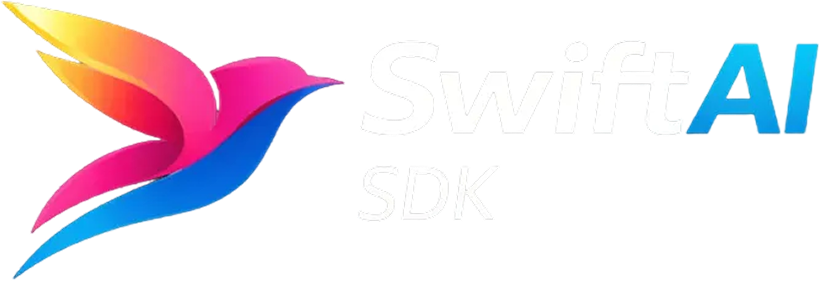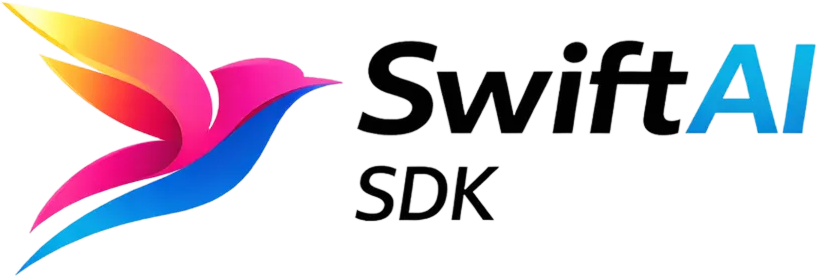Model Context Protocol (MCP) Tools
This page adapts the original AI SDK documentation: Model Context Protocol (MCP) Tools.
Warning The MCP tools feature is experimental and may change in the future.
The AI SDK supports connecting to Model Context Protocol (MCP) servers to access their tools. This enables your AI applications to discover and use tools across various services through a standardized interface.
Initializing an MCP Client
Section titled “Initializing an MCP Client”The Swift AI SDK currently ships with an HTTP-based SSE transport. Use it for production deployments. If you need a different execution environment, provide a custom type that conforms to MCPTransport.
Create an MCP client using one of the following transport options:
- SSE transport (Recommended): Uses
SseMCPTransportto connect to an MCP server over HTTP(S) - Custom transport: Implement
MCPTransportfor specialised requirements (for example an internal proxy)
SSE Transport (Recommended)
Section titled “SSE Transport (Recommended)”import SwiftAISDK
let client = try await createMCPClient( config: MCPClientConfig( transport: .config(MCPTransportConfig( type: "sse", // only "sse" is supported by the built-in factory url: "https://your-server.com/mcp", headers: ["Authorization": "Bearer YOUR_TOKEN"] )) ))Custom Transport
Section titled “Custom Transport”You can also bring your own transport by implementing the MCPTransport interface for requirements not covered by the standard transport.
import SwiftAISDK
final class MyTransport: MCPTransport { var onclose: (() -> Void)? var onerror: ((Error) -> Void)? var onmessage: ((JSONRPCMessage) -> Void)?
func start() async throws { // open connection }
func send(message: JSONRPCMessage) async throws { // forward JSON-RPC message to the server }
func close() async throws { // close connection }}
let client = try await createMCPClient( config: MCPClientConfig(transport: .custom(MyTransport())))Note The client returned by
createMCPClientis a lightweight adapter intended for tool conversion. It currently does not include every feature of the full MCP spec (authorization, session management, resumable streams, notifications, etc.).
Closing the MCP Client
Section titled “Closing the MCP Client”After initialization, you should close the MCP client based on your usage pattern:
- For short-lived usage (e.g., single requests), close the client when the response is finished
- For long-running clients (e.g., command line apps), keep the client open but ensure it’s closed when the application terminates
When streaming responses, you can close the client when the LLM response has finished. For example, when using streamText, provide an onFinish callback that closes the client after the final step:
import SwiftAISDKimport OpenAIProvider
let client = try await createMCPClient( config: MCPClientConfig(transport: .config(MCPTransportConfig(url: "https://your-server.com/mcp"))))
let tools = try await client.tools(options: nil)
let stream = try streamText( model: openai("gpt-4.1"), tools: tools, prompt: "What is the weather in Brooklyn, New York?", onFinish: { _ in Task { try? await client.close() } })
for try await delta in stream.textStream { print(delta, terminator: "")}When generating responses without streaming, you can use defer (or another cleanup mechanism) to close the client:
import SwiftAISDKimport OpenAIProvider
let client = try await createMCPClient( config: MCPClientConfig(transport: .config(MCPTransportConfig(url: "https://your-server.com/mcp"))))defer { Task { try? await client.close() } }
let output = try await generateText( model: openai("gpt-4.1"), tools: try await client.tools(options: nil), prompt: "Describe the current Brooklyn weather in one sentence.")print(output.text)Using MCP Tools
Section titled “Using MCP Tools”The client’s tools method acts as an adapter between MCP tools and AI SDK tools. It supports two approaches for working with tool schemas:
Schema Discovery
Section titled “Schema Discovery”With schema discovery, all tools offered by the server are automatically listed, and input parameter types are inferred based on the schemas provided by the server:
import SwiftAISDK
let tools = try await client.tools(options: nil) // same as automatic discoveryThis approach is simple to implement and automatically stays in sync with server changes. However, you will not have compile-time type information for inputs, and every tool exposed by the server becomes available to the model.
Schema Definition
Section titled “Schema Definition”For better type safety and control, you can define the tools and their input schemas explicitly in your client code:
import SwiftAISDK
struct GetDataInput: Codable, Sendable { let query: String let format: Format
enum Format: String, Codable, Sendable { case json case text }}
struct EmptyArgs: Codable, Sendable {}
func jsonObjectSchema<T: Codable & Sendable>(_ type: T.Type) -> FlexibleSchema<[String: JSONValue]> { let typedSchema = FlexibleSchema.auto(type).resolve() return FlexibleSchema(jsonSchema { try await typedSchema.jsonSchema() })}
let tools = try await client.tools(options: MCPToolsOptions( schemas: .schemas([ "get-data": ToolSchemaDefinition(inputSchema: jsonObjectSchema(GetDataInput.self)), "tool-with-no-args": ToolSchemaDefinition(inputSchema: jsonObjectSchema(EmptyArgs.self)) ])))This helper derives the provider-facing JSON Schema from your Codable types, keeping the Swift client in sync with MCP tool definitions.
This approach gives you explicit control over tool interfaces and enables stronger validation: the schemas you provide are enforced at runtime, and only the tools you enumerate are retrieved from the server.
Examples
Section titled “Examples”You can see MCP tools in action in the following example:
- Learn to use MCP tools in Node.js — the concepts are the same; adapt the transport section to Swift as shown above.

